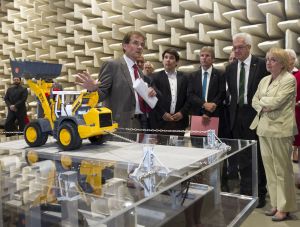Today, July 01, 2015, young scientists of Karlsruhe Institute of Technology (KIT) presented their research to Minister-President Winfried Kretschmann and Minister Theresia Bauer, who came to visit the KIT. Among the topics discussed were energy, mobility, information technologies, medical engineering, and genetics. In addition, the central institution for the support of doctoral students and the network of young scientists of KIT presented themselves. The Minister-President and Minister also visited the vehicle test rigs on Campus East of KIT and informed themselves about KIT’s mobility research activities.
“Exchange of ideas with universities is one of my major concerns and will remain so in the future,” says Minister-President Winfried Kretschmann. “After all, universities and colleges have a high responsibility for sustainable development in all areas of society and for the innovativeness of the state. They are sources of inspiration addressing urgent problems of our time.”
“The KIT that resulted from the merger of a Helmholtz Center with a State University is unique and a role model for Germany,” Theresia Bauer, Baden-Württemberg Minister of Science, emphasizes. “The state government considers it an important task to further strengthen the potentials resulting from this constellation.”
“Today’s doctoral students are tomorrow’s developers, who will find solutions for the challenges of society. Hence, investments in excellent research conditions for young scientists is money well spent,” says the President of KIT, Professor Holger Hanselka. “As regards the support of young scientists, politics is presently making important decisions. This topic is at the top of the agenda, which is also reflected by today’s visit of Minister-President Kretschmann and Minister Bauer. “We consider this an important signal for future generations of scientists.”
Eight young scientists, including doctoral students and heads of young investigator groups, presented their research projects to Minister-President Winfried Kretschmann and Minister Theresia Bauer. Projects in the area of future energy supply focus on electrochemical energy storage, stationary storage systems, and highly efficient tandem solar cells. In the area of information technologies, researchers study aspects of business information systems and smart grid simulation. The wide scope of research at KIT was also reflected by presentations about electric mobility, medical engineering, and genetics.
Presently, more than 3000 young scientists are working on their doctorate at KIT. About 50 young scientists head young investigator groups. Support of young scientists is of high priority at KIT. The Karlsruhe House of Young Scientists (KHYS) is a central institution for the support of doctoral students at KIT. KIT‘s Young Investigator Network (YIN) is the only network of young scientists in Germany.
On KIT’s Campus East, Kretschmann and Bauer informed themselves about research at KIT’s Mobility Systems Center. The guests had a look at test rigs used for studying noise development in vehicles, optimizing combustion engines, and reducing CO2 emissions. The KIT Mobility Systems Center pools KIT’s mobility research activities. Presently, about 40 KIT institutes with about 800 employees are working on methodological and technical fundamentals for tomorrow’s vehicles. It is their objective to develop concepts, technologies, methods, and processes for future mobility considering the complex interactions of vehicle, driver, traffic, infrastructure, and society.
In close partnership with society, KIT develops solutions for urgent challenges – from climate change, energy transition and sustainable use of natural resources to artificial intelligence, sovereignty and an aging population. As The University in the Helmholtz Association, KIT unites scientific excellence from insight to application-driven research under one roof – and is thus in a unique position to drive this transformation. As a University of Excellence, KIT offers its more than 10,000 employees and 22,800 students outstanding opportunities to shape a sustainable and resilient future. KIT – Science for Impact.

